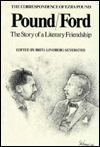

 |

|

The average rating for Ezra Pound and Ford Madox Ford: The Story of a Literary Friendship based on 2 reviews is 4.5 stars.
Review # 1 was written on 2020-08-08 00:00:00 Jake Martins Jake MartinsThis book was a wonderful selection of both letters between two literary giants, Ezra Pound and Ford Madox Ford, and essays by each of them on the other person. Ford Madox Hueffer (who later changed his last name to 'Ford') was a kind of literary mentor to Pound when he first burst upon the London literary scene in 1908. Through reading these letters and essays, you can get a good idea of where Pound received much of his literary learning and scholarship. Of course it began through his devoted studies of medieval literature and languages (such as the work of the Provencal troubadours) but when he actually travelled to Europe, leaving 'Murka' (as he called it) behind, his true apprenticeship began as he got in touch, one by one, with the people who would stimulate his mind and foster his growth as a poet and writer. Pound gravitated between two poles or spheres of influence: W. B. Yeats and Ford. As Pound himself admits in an interview: "I made my life in London by going to see Ford in the afternoons and Yeats in the evenings. By mentioning one to the other one could always start a discussion. That was the exercise. I went to study with Yeats and found that Ford disagreed with him. So then I kept on disagreeing with them for twenty years." (Pound/Ford: p. 181) Six years after Ford's death (in 1939), Pound would reflect upon his literary buddy's influence and talent as a prose writer and especially as a critic by including him in his legendary Pisan Cantos (1945). Despite their differences and disagreements (their biggest one being Ford's absolute rejection of fascism and Pound's unfortunate embrace of Mussolini's vision and fascism), both of these men never failed to appreciate each other's work and talent. Pound admired Ford's ability to critique literature more than anyone in the world and his ability to incubate stimulating conversation while Ford admired Pound's abilities as a poet, especially in the early Cantos. After Pound was sent to St. Elizabeth's after being legally called insane, Charles Olson went to visit him and Olson could sense Pound's sense of guilt over not acknowledging Ford's talents and ability as a novelist more in his lifetime. What I loved about this book is that it not only contained fascinating and sometimes explosive letters between these two great writers but it also featured some great essays by both of them and other valuable information by the editor who paints a chronological picture of their relationship as it developed, temporarily soured, and then was restored again, over time. Pound and Ford did finally meet up in NY a few months before Ford's death but Pound was meant to come around to Ford's place a few days before his departure back to Europe. Pound didn't make it that day nor to a gathering of the Friends of William Carlos Williams (a society formed by Ford for Williams' benefit). Apparently Pound was too "tired" on the day but his decision not to go may have haunted him later on as Ford died on the passage back and the two men never met again, unless there is a great Elysium in the sky where all the great writers can go after life. I'm already familiar, to some degree, with Pound's qualities as both a person and poet but this book has made me interested in reading Ford's numerous essays and novels, especially his tetralogy Parade's End, one of several books which Pound admired. If you are interested in either of these two writers, early twentieth century literature or history, modernism, or reading letters in general, this book is highly recommended for you. There is much 'food for thought' within. |
Review # 2 was written on 2017-05-16 00:00:00 Vincent Morgan Vincent MorganIsaac Asimov was a prolific writer. Over the course of his career, he wrote nearly 500 books. That is not unusual of itself. What is amazing is that he had books published in all ten of the major categories of the Dewey Decimal system. His books were translated into many languages. He received letters from fans from all over the world. And he answered them himself keeping carbon copies of his replies. After Asimov's death, his brother sorted through some 40,000 letters and postcards. He selected from these and assembled this book. The letters are loosely arranged by topic. Now that the dry description is done, read this book for the fun of it. Asimov had a big sense of humor and it shows in many of the letters. His limericks are a bit ribald, as good limericks often are. Some of the topics are worthy of careful consideration. Anyone familiar with Asimov should read this book. Any science fiction fan should read this book. Any Shakespeare lover should read this book. Writers should read this book. Just read this book. |
CAN'T FIND WHAT YOU'RE LOOKING FOR? CLICK HERE!!!